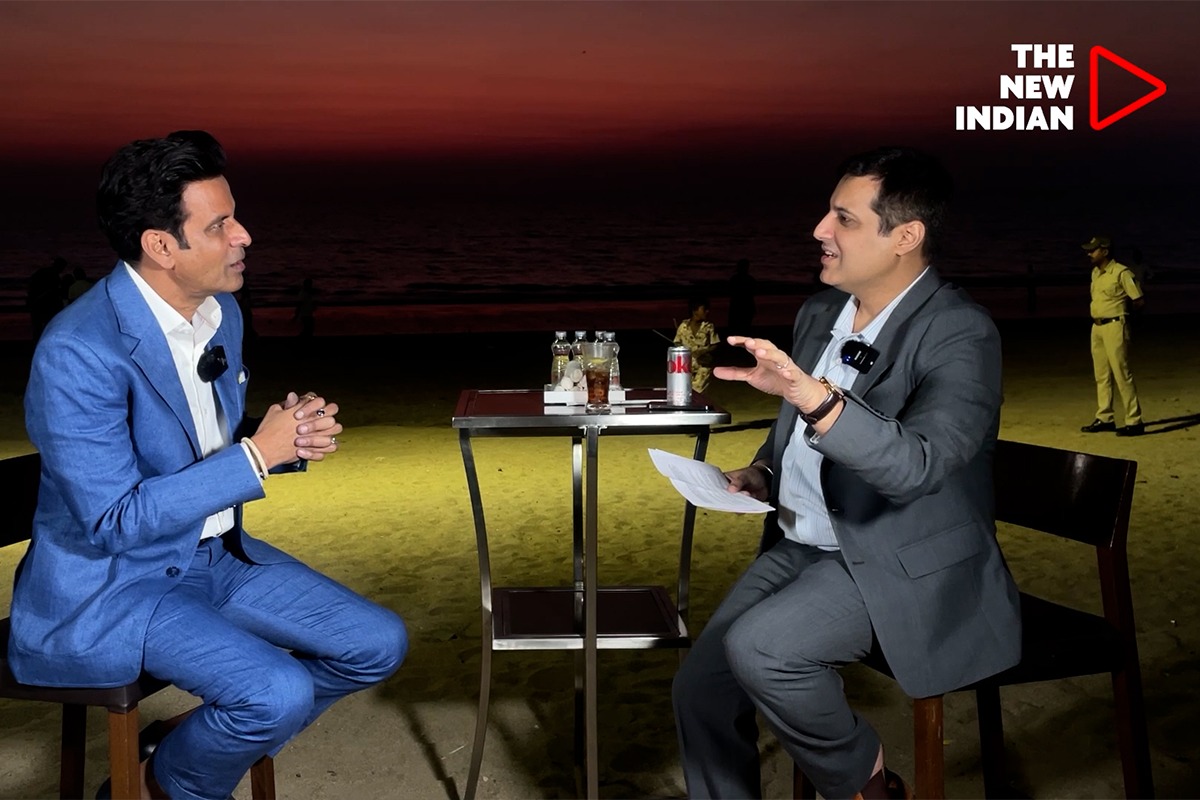

MUMBAI : From a next-door boy, knocking on Urmila Matondkar’s door in ‘Kaun’ to proclaiming himself as the ‘King of Mumbai,’ Bhiku Maitre, Padma Shri Manoj Bajpayee, has achieved unparalleled success in cinema and the latest buzz on OTT. In an exclusive interview with The New Indian’s Executive Editor, Rohan Dua, Manoj Bajpayee shares his views on the depiction of abusive language in movies and how he did not allow his daughter to watch his recent Netflix series ‘Killer Soup’ which is making waves on OTT.
Rohan: I want to congratulate you for a stellar incredible career that you have had over the 30 years. It’s not an easy feat to scale the heights that you did, having come from the small town of Bihar which you’re not ashamed of and you discuss this very openly. Shedding inhibitions to conquer Mumbai and become the Manoj Bajpayee we know today must have had its challenges. How difficult or easy was the journey to becoming the person you are now?
Manoj Bajpayee: “Well, not just me, but I want to add a disclaimer that everyone goes through it, and I don’t want to glorify my struggle. However, there is no denying that every step is challenging when you’re an outsider and new to the industry.
Initially, the struggle is to find a place, some money for sustenance, and a roof over your head. Then comes the quest for work, and if you can’t find it, surviving in the competitive world of Mumbai’s film industry becomes daunting. In a country with a vast population, even with belief and conviction in your abilities, it’s not easy, especially coming from a lower-middle-class farmer’s family.
View this post on Instagram
I could only rely on my theatre experience and the craft I had learned over the years. Even after Satya and Bhiku Mhatre, things didn’t get easier. The industry has never been welcoming to newcomers, and those in positions often felt insecure. To overcome these challenges, your conviction and fierceness become your best tools. Coming from Bihar and a village, I always had a fierceness and stubbornness in abundance. This never-say-die attitude and aggressive approach in the face of obstacles have been crucial. I thank God, and ultimately, I thank my mother for instilling in me that never-surrender attitude. It’s been 30 years – a realisation that hit me when you were introducing me.
Rohan: The offensive language and lewd expressions on OTT platforms can be touchy. I appreciate the conversations depicted in some OTT content, as they bring out the real-life culture of street urchins. Nearly one-third of India lives in villages and hinterlands where this language is prevalent. While it may seem offensive initially, it reflects the authenticity that was initially perceived as bad due to its portrayal on the mainstream screen for the first time.
Manoj Bajpayee: “Even now, many people get offended, they use social media or Twitter to express themselves. While their numbers are low, I always say one thing, 18 years and above is stated on the card for educated people. If you don’t want to see it, then don’t. The Constitution grants this right. If you are educated, don’t show it to your child. I’m not showing ‘Killer Soup’ to my daughter; she has seen things, like ‘Family Man,’ at that age, but we limit her exposure. I believe in controlling the use of abusive language in society, especially in front of my child. Even though I occasionally slip, I make an effort to control it. However, when I visit my village or small town, I can’t control others.
Rohan: Over the past two and a half days, I immersed myself in understanding the characters of Umesh Pillai and Prabhakar. Before our interview, I took the opportunity for introspection, surprised by the unique challenge of portraying a double role – one character calmly conversing, while the other passionately screaming abuses…
Manoj Bajpayee: Yes, indeed. He’s a rather unpleasant individual, viewing his wife as merely a possession. A man who perceives himself as a failure and blames his family for everything, despite not achieving much in life. On the flip side, another man is aspiring for greatness, albeit lacking the capability. He’s a romantic, deeply in love with a woman. It goes to show, that it’s never about the physical traits like a squint or a limp; it’s always about the person you are connecting with.
Manoj Bajpayee awarded the Padma Shri for “Sonchiriya,” deems it a miracle. When asked about the honour, he succinctly calls it a miraculous moment in his career.
Rohan: With the incredible career you’ve had, there must have been a lot on your mind. What were your thoughts when you were awarded the Padma, or when you received the announcement, the whisper that Mr Bajpayee, you’re going to be decorated and felicitated with the country’s prestigious honour like the Padma in 2019? What crossed your mind?
Manoj Bajpayee: I view it as a miracle every time something like this happens. To truly understand the journey I’ve undertaken, one must visit my village. It’s a miracle that all of this is happening to me, that the country knows my name – it’s truly miraculous. I felt bad on the day of the Padma Shri when the President was going to felicitate me. My mother was in the hospital, having been operated for cancer, and she couldn’t come. My father and wife accompanied me. I felt very proud that my father, an old man, could witness that day. I am extremely proud that my wife was there. It was a mix of emotions for me when all the dignitaries were applauding each other.